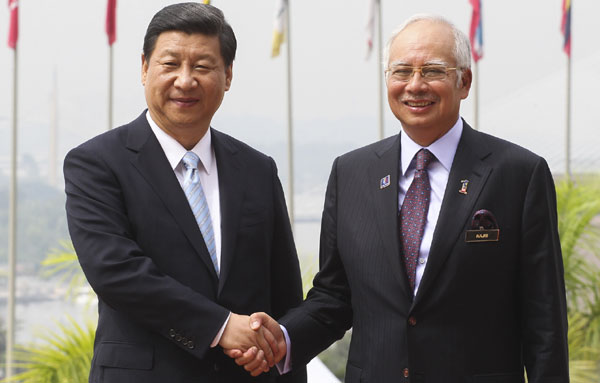China and Malaysia set blueprint to boost ties
By Wu Jiao in Kuala Lumpur and Zhao Shengnan in Beijing ( China Daily )
Updated: 2013-10-05
China, Malaysia to increase trade, upgrade relations to strategic partnership
China and Malaysia agreed on a five-year economic and trade cooperation blueprint on Friday and pledged to form a comprehensive strategic partnership.
The agreement was made when President Xi Jinping met Malaysian Prime Minister Najib Razak during his first visit to the Southeast Asian nation.
|
 |
|
President Xi Jinping?(L) shakes with Malaysian Prime Minister Najib Razak on Thursday.[Photo/Xinhua] |
Companies and financial agencies from both sides also signed $5 billion worth of deals.
The two countries will aim for $160 billion in bilateral trade by 2017 from the current $94 billion, and have agreed to upgrade ties to a comprehensive strategic partnership, Xi told reporters after his talks with Najib.
They will also strengthen their partnership in naval defense and joint military exercises to combat terrorism and promote security.
Analysts said the agreements in both political and economic sectors will lay out a vision and strategy for both countries to deepen the bilateral economic and trade relationship.
The Five-Year Program for Economic and Trade Cooperation aims to develop 11 key sectors, ranging from agriculture, manufacturing and infrastructure, to telecommunications and tourism.
At a bilateral economic summit on Friday afternoon, Xi said the program "sets the goals for bilateral economic and trade cooperation" that will benefit not only the two countries, but also the whole region.
Najib said the program heralds a new phase in bilateral relations.
"It sets out a clear vision of our common ambition, which is deepening bilateral and economic relations, yielding an elevated strategic partnership between our countries," Najib said.
Malaysian International Trade and Industry Minister Mustapa Mohamed said although the program is a bilateral cooperation between two governments, it emphasizes providing business and investment opportunities to players in the private sector.
To lift economic cooperation, Xi urged both countries to use the Malaysia-China Qinzhou Industrial Park and Kuantan Industrail Park as pilot programs to attract more industries.
China also encourages Chinese companies to take part in the development of north Malaysia and the high-speed railway linking Kuala Lumpur and Singapore, Xi said.
The two leaders also called for an increase in mutual investment and enlarged local currency settlement in bilateral trade, as well as lower logistics costs and avoid financial risks.
Malaysia is the first country outside China to use the renminbi, and the Malaysian central bank is the first in the Association of Southeast Asian Nations to hold renminbi reserves, yet few entrepreneurs are aware of this.
"We should do more to promote this monetary cooperation," Najib said.
As of last year, Malaysia's cumulative foreign direct investment in China stood at $6.3 billion. Chinese investment in Malaysia is a fraction of that.
Zhang Yunling, a senior research fellow on Asia-Pacific studies at the Chinese Academy of Social Sciences, said both sides can complete their inadequate industrial chains and strengthen China-ASEAN economic ties through closer cooperation of greater scope and higher quality.
"For example, Malaysia is a manufacturing center of electronic parts in ASEAN, while China is a global center for assembly," he said. "If they have more joint electronic projects, productivity can be improved and more Chinese investment can be introduced to ASEAN."
Qu Xing, president of the China Institute of International Studies, said the efficient connectivity between China and Malaysia will greatly facilitate exchanges between China and ASEAN.
Experts also noted that elevated China-Malaysia relations will help China to coordinate ties with the 10-member ASEAN on regional and global affairs, and be a step closer to realizing an "upgraded version" of the China-ASEAN free trade area proposed by China.
Malaysia is the second leg of Xi's maiden trip to Southeast Asia since taking office in March. He started the journey on Wednesday and will have his inaugural appearance at an Asia-Pacific summit on the Indonesian resort island of Bali.
Before the meeting with Najib on Friday, Xi received a red-carpet welcome held by 85-year-old Malaysian Supreme Head of State Abdul Halim Mu'adzam Shah.
China has overtaken the United States as Malaysia's largest trading partner in the last four years.
Malaysia has been China's biggest trading partner in Southeast Asia for the last five years, and it looks set to become China's third-largest trading partner in Asia, with bilateral trade topping $100 billion, after Japan and South Korea.
In addition, the two countries on Friday saw progress in education cooperation. Xiamen University in Fujian Province is the first Chinese university to have a campus outside China, opening Xiamen University Malaysia Campus.
The campus will accommodate 10,000 students and mark another milestone in bilateral education cooperation. It is expected to attract more international students from China and the wider region.
Schedule

President Xi visits Indonesia, Malaysia, attend APEC summit
Oct 2 to 3: Pay State Visit to Indonesia
Oct 4 to 5: Pay State Visit to Malaysia
Oct 6 to 8: Attend the 21st economic leaders' meeting of APEC forum and meet with global leaders in Bali, Indonesia
Forum
China and ASEAN to handle territorial issues like friends
China and its neighbours should handle the issue of territorial claims as a problem between friends rather than a conflict with one another.
China should increase investment in ASEAN
China should ratchet up cooperation with Association of Southeast Asian Nations countries to expand Beijing's regional influence while countering Washington's Asia-Pacific pivot strategy.










